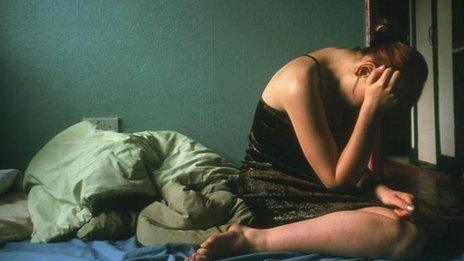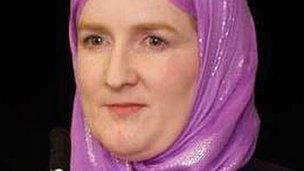Grooming 'coalition' launched to tackle child sex abuse
- Published

The anti-grooming coalition is being given expert guidance by the National Association for People Abused in Childhood (NAPAC) and Victim Support
A new coalition of community groups is being launched later in a bid to tackle on-street grooming of children by gangs.
In the aftermath of recent child sex abuse trials, leading Muslim and child protection organisations are launching the Community Alliance Against Sexual Exploitation (CAASE) in Bradford on Friday.
It is being led by the Islamic Society of Britain and anti-racism campaign group Hope Not Hate with the aim of mobilising campaigns against grooming, producing training material for faith leaders and creating local groups to work on tackling street grooming in areas where it is a problem.
In May 2012, a group of Rochdale men, eight of Pakistani origin and one from Afghanistan, were found guilty of a number of offences after exploiting vulnerable girls as young as 13.
'White males'
There has been a great deal of debate since about the significance of the men's religion and heritage.
Julie Siddiqi, of the Islamic Society of Britain, said it was time for some very straight talking about a crime in which men from Muslim backgrounds are being implicated.

Julie Siddiqi says "doing nothing is not an option"
"I am willing to go as far as to say there does seem to be a pattern emerging of people from the same background and we need to be open about that and do something about it," she said.
"It's certainly not Islam telling them to do this but I think Muslim groups need to be at the forefront of looking at this issue.
"The facts and figures need to be much better on this. At the moment it's very easy for someone to say to me - which they do - that actually most of the perpetrators of child abuse in this country are white males.
"But this particular behaviour and way of going about it does seem to be related to people of a certain background."
The coalition, which is being formally launched at the Manningham Mills Community Centre on Friday, also has backing from the Muslim Council of Britain, Muslim Youth Helpline, Christian Muslim Forum, City Sikhs and the Church of England.
Professional guidance is being provided by NAPAC (National Association for People Abused in Childhood) and Victim Support.
Stereotypes warning
Nick Lowles, of Hope Not Hate, says it is vital there is an open and honest discussion, and that groups like the EDL and BNP should not be the ones left to exploit the issue and spread mistruths.
"There are few issues that have the potential to divide like this one and it's not being talked about at a community level," he said. "No-one is really looking at the best way to actually tackle this.
"We are expecting some pushback on this, not everyone wants us to talk about it, so we have to try and involve everyone."
The coalition will also bring in the work of Alyas Karmani, director of STREET (Strategy To Reach Educate and Empower Teenagers).
He says the role of his organisation is to deliver practical prevention work - both safeguarding potential victims and working with young men who are potential perpetrators. But Mr Karmani says his work will not focus on one community.
"Sexual predators come from all backgrounds and all sections of society and they're actually very sophisticated about identifying any child, boy or girl, who is vulnerable," he said.
"That is why we need to be vigilant about not creating stereotypes around just Pakistani men, or just white girls in the care system, because that detracts from us being much more aware of the bigger picture."
According to Julie Siddiqi, it is time for a lot of people to stand up and not just talk, but take action.
"We cannot keep reading about these cases for the next five or 10 years: doing nothing is not an option."
You can hear more on this story on the BBC Asian Network on Friday 10 May at 13:00 GMT and 17:00 GMT or listen back on BBC iPlayer